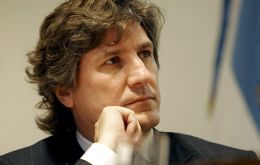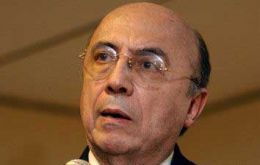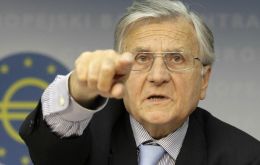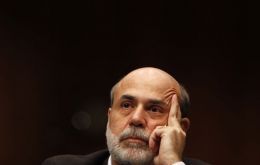MercoPress. South Atlantic News Agency
Tag: interest rate
-
Friday, November 5th 2010 - 22:41 UTC
Australia and India increase interest rates amid fears of rising inflation

Australia and India have both raised interest rates by a quarter percentage point amid fears of rising inflation. The central bank of Australia put up rates from 4.5% to 4.75%, surprising markets with the first rise since May.
-
Friday, September 10th 2010 - 03:45 UTC
Bank of England leaves interest rates on hold at 0.5% for 18th month running

The Bank of England has kept UK interest rates on hold at a record low of 0.5% for the 18th consecutive month. The Monetary Policy Committee's (MPC) decision had been expected, but calls have been growing for an increase in rates to curb inflation.
-
Tuesday, August 10th 2010 - 01:30 UTC
Argentina confident it can issue debt in US dollars below 9% interest rate

Argentine Economy Minister Amado Boudou confirmed what newspaper Ámbito Financiero had anticipated a week ago: the plan is to issue debt in US dollars but below the 9% mark, which with the current panorama may allow for an even lower percentage index.
-
Friday, August 6th 2010 - 06:01 UTC
Bank of England leaves rate on hold at 0.5%; concerns over recovery strength

The Bank of England has voted to keep interest rates on hold at 0.5% amid concerns over the strength of the economic recovery. The decision by the bank's Monetary Policy Committee (MPC) means rates will stay at their current record low for an 18th month. It suggests the committee does not see high inflation as a serious concern.
-
Thursday, July 22nd 2010 - 10:18 UTC
Brazil anticipating ‘external factors recent evolution’ eases interest rate policy

Brazil’s central bank signalled it may stop raising interest rates soon after policy makers unexpectedly slowed the pace of increases and said inflation was less of a threat amid slowing global growth.
-
Friday, July 9th 2010 - 05:34 UTC
Euro zone rates unchanged; all eyes set on 23 July EU banks’ stress-tests

The European Central Bank left its key interest rate on hold for the fourteenth consecutive month in July as the region's banks face stress tests to ensure the stability of the financial system that is threatened by investor fears about debt.
-
Friday, July 9th 2010 - 05:29 UTC
UK leaves rates at a record low for the 16th month running

The Bank of England has kept UK interest rates on hold at a record low of 0.5% for the 16th consecutive month. The Bank's Monetary Policy Committee (MPC) also decided on Thursday not to inject any more money into the economy under its policy of quantitative easing (QE).
-
Wednesday, May 5th 2010 - 06:33 UTC
Australia Raises Interest Rate for the Sixth Time in Eight Months

Australia's central bank has raised interest rates for the sixth time in eight months as the country's economy continues to recover. The target interest rate is now at 4.5%—up from 3% in October last year.
-
Thursday, April 29th 2010 - 07:03 UTC
Fearing an Over-Heated Economy Brazil Hikes Basic Rate 75 Points to 9.5%

Central Bank of Brazil increased on Wednesday the benchmark interest rate for the first time in 19 months in an effort to cool an economy forecast to expand 6% this year, one of the highest rates in two decades.
-
Thursday, April 29th 2010 - 03:12 UTC
Federal Reserve Anticipates Exceptionally Low Level Rates for an Extended Period

The US Federal Reserve decided on Wednesday to leave interest rates unchanged saying the current recovery will not result in rampant inflation and anticipated exceptionally low level rates for an extended period.
